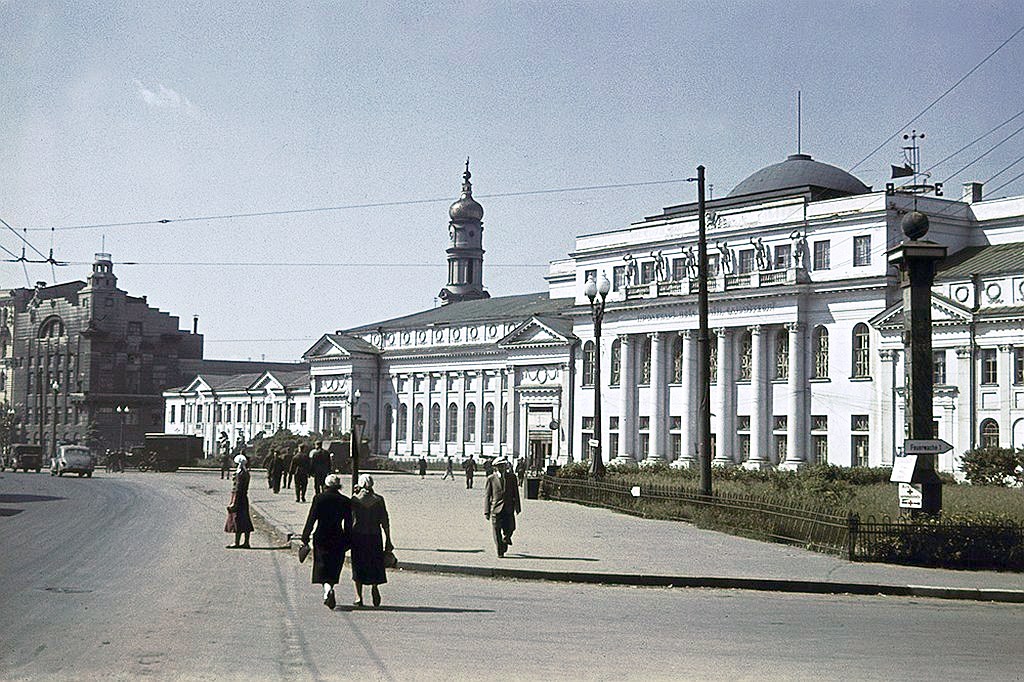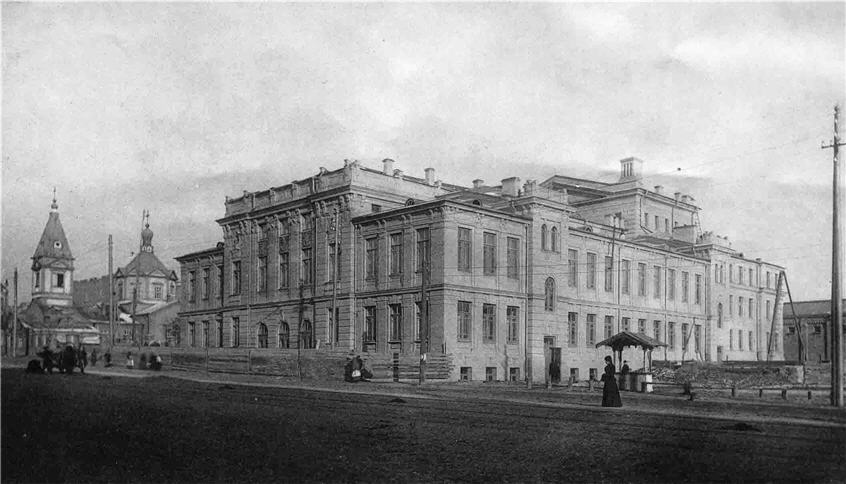|
Third All-Ukrainian Congress Of Soviets
Third All-Ukrainian Congress of Soviets ( uk, Всеукраїнський з'їзд Рад) was a congress of Soviets (councils) of workers, peasants, Red-army-men deputies that took place in Kharkiv on March 6 - 10, 1919. The congress followed the Third Congress of the Communist Party of Ukraine that took place on March 1 - 6, 1919. It was the first congress after the first reoccupation of Ukraine by Soviets. According to declaration of the Provisional Workers' and Peasants' Government of Ukraine of 28 January 1919, the congress had to be summoned no later than March 1, 1919. Composition There were 1,787 delegates out which 1,719 had a ruling vote. Agenda * Report of the Provisional Workers' and Peasants' Government of Ukraine * Military issue * Food supply issue * Land property issue * About a draft of the First Constitution of the Ukrainian SSR Decisions The congress approved the Provisional Workers-Peasants government of Ukraine and decided to reorganize it into Workers-Pe ... [...More Info...] [...Related Items...] OR: [Wikipedia] [Google] [Baidu] |
Kharkiv
Kharkiv ( uk, wikt:Харків, Ха́рків, ), also known as Kharkov (russian: Харькoв, ), is the second-largest List of cities in Ukraine, city and List of hromadas of Ukraine, municipality in Ukraine.Kharkiv "never had eastern-western conflicts" ''Euronews'' (23 October 2014) Located in the northeast of the country, it is the largest city of the historic Sloboda Ukraine, Slobozhanshchyna region. Kharkiv is the administrative centre of Kharkiv Oblast and of the surrounding Kharkiv Raion. The latest population is Kharkiv was founded in 1654 as Kharkiv fortress, and after these humble beginnings, it grew to be a major centre of industry, trade and Ukrainian culture in the Russian Empire. At the beginning of the 20th century, ... [...More Info...] [...Related Items...] OR: [Wikipedia] [Google] [Baidu] |
Communist Party Of Ukraine (Soviet Union)
The Communist Party of Ukraine ( uk, Комуністична Партія України ''Komunistychna Partiya Ukrayiny'', КПУ, ''KPU''; russian: Коммунистическая партия Украины) was the founding and ruling political party of the Ukrainian Soviet Socialist Republic operated as a republican branch (union republics) of the Communist Party of the Soviet Union (CPSU).Pyrih, R. Communist Party of Ukraine, the Soviet period (КОМУНІСТИЧНА ПАРТІЯ УКРАЇНИ РАДЯНСЬКОЇ ДОБИ)'. Encyclopedia of History of Ukraine. 2007 No decision of the government of Ukraine (Council of Ministers) was adopted without approval of the Central Committee of the Communist Party of Ukraine. The Communist Party of Ukraine is not one and the same party as the Ukrainian Communist Party or Ukrainian Communist Party (Borotbists). Founded as the Communist Party (Bolsheviks) of Ukraine (CP(b)U) in 1918 in Moscow, Russian SFSR, it was the sole g ... [...More Info...] [...Related Items...] OR: [Wikipedia] [Google] [Baidu] |
Provisional Workers' And Peasants' Government Of Ukraine
The Provisional Workers-Peasants Government of Ukraine (russian: Временное рабоче-крестьянское правительство Украины, uk, Тимчасовий Робітничо-Селянський Уряд України) was provisional Soviet government created on November 28, 1918, in Kursk on decision of the Communist Party of Ukraine and help of the Russian Workers-Peasants Red Army (RKKA), with its place of location was assigned the city of Sudzha (today in Kursk Oblast). On the same day the government released its manifest. This Soviet government was created in the very same way as the Provisional Workers' and Peasants' Government of Belorussia which on 1 January 1919 also issued its manifest in Minsk. The Provisional Workers-Peasants Government of Ukraine became the highest legislative, executive and administrative body of Soviet power in Ukraine as the Soviet Russia resumed hostilities against Ukraine. All-Ukrainian Central Military Revolu ... [...More Info...] [...Related Items...] OR: [Wikipedia] [Google] [Baidu] |
Constitution Of The Ukrainian SSR
The Ukrainian Soviet Socialist Republic, part of the Soviet Union, had four successive constitutions during its existence. The first (1919) was in Russian and the final three were in Ukrainian. The final constitution remained effective until the Constitution of Ukraine came into force in 1996. Constitution of 1919 The constitution was approved by the 3rd All-Ukrainian Congress of Soviets on 10 March 1919 and its final version was approved by the All-Ukrainian Central Executive Committee session on 14 March 1919. The draft of the constitution was created on resolution of the 3rd congress of the Communist Party (Bolsheviks) of Ukraine by the All-Ukrainian Central Executive Committee and the Ukrainian Sovnarkom and was approved by the Central Committee of the Communist Party (Bolsheviks) of Ukraine. It was based on the 1918 Constitution of the Russian SFSR.Boiko, V. The 1919 Constitution of the Ukrainian Socialist Soviet Republic (КОНСТИТУЦІЯ УКРАЇНСЬКОЇ СО ... [...More Info...] [...Related Items...] OR: [Wikipedia] [Google] [Baidu] |
All-Ukrainian Council Of People's Commissars
Council of People's Commissars of the Ukrainian SSR ( uk, Рада Народних Комісарів УРСР) or the Radnarkom ( uk, Раднарком) was the highest governing body of executive power in Ukrainian SSR from January 1919 to 1946. Until 1937 it was also a legislative body as well. The council replaced the Temporary Workers-Peasants Government of Ukraine in January 1919. In 1919 during the advance of the Anton Denikin, Denikin's Army (Armed Forces of South Russia) the role of the council was suspended and for a short period it was merged with the Central Executive Committee of Ukraine and leadership of the Communist Party (Bolsheviks) of Ukraine forming the All-Ukrainian Revolutionary Committee. List of governments * People's Secretariat (Skrypnyk, 1917–1918) ** Insurgent Bureau (underground resistance) / Central Military Revolutionary Committee (1918) * Provisional Workers-Peasants Government of Ukraine (Pyatakov, 1918–1919) * First Rakovsky Government (1919 ... [...More Info...] [...Related Items...] OR: [Wikipedia] [Google] [Baidu] |
Military Communism
War communism or military communism (russian: Военный коммунизм, ''Voyennyy kommunizm'') was the economic and political system that existed in Soviet Russia during the Russian Civil War from 1918 to 1921. According to Soviet historiography, the ruling Bolshevik administration adopted this policy with the goal of keeping towns (the proletarian power-base) and the Red Army stocked with food and weapons since circumstances dictated new economic measures. During the civil war, the old capitalist market-based system was unable to produce food and expand the industrial base. War communism has often been described as simple authoritarian control by the ruling and military castes to maintain power and control in the Soviet regions, rather than any coherent political ideology. War communism began in June 1918, enforced by the Supreme Economic Council (russian: Высший Совет Народного Хозяйства), known as the Vesenkha. It ended on 21 March 1921 w ... [...More Info...] [...Related Items...] OR: [Wikipedia] [Google] [Baidu] |
All-Ukrainian Central Executive Committee
All-Ukrainian Central Executive Committee ( uk, italic=yes, Всеукраїнський центральний виконавчий комітет) was a representative body of the All-Ukrainian Congress of Soviets. It was the supreme legislative, administrative, executive controlling state power of Soviet Ukraine (Ukrainian SSR) between the sessions of the Congress of Soviets that acted between 1917 until 1938. In the very beginning this institution was established as the Central Executive Committee of Soviet of Ukraine at the First All-Ukrainian Congress of Soviets in Kharkiv on December 24–25, 1917. At the same congress was elected the People's Secretariat of Ukraine. On March 19, 1919, the committee issued a declaration, in which it passed most of its authority to the Sovnarkom of Ukraine at that time headed by Christian Rakovsky. Historical scope The committee was first elected at the 1st All-Ukrainian Congress of Soviets on December 24, 1917, under the name of TsVK of So ... [...More Info...] [...Related Items...] OR: [Wikipedia] [Google] [Baidu] |
First Rakovsky Government
First Rakovsky Government was a government led by Christian Rakovsky who replaced the former Soviet provisional government in Ukraine that came into crisis. History The Bolshevik insurgent Milrevkom was liquidated with establishment of the Provisional Workers-Peasants Government of Ukraine on November 28, 1918. The Council of People's Commissars was created on January 29, 1919 after Yuri Pyatakov was unable to find compromise with members of his government (Provisional Workers-Peasants Government of Ukraine). There was a political struggle between Pyatakov and Fyodor Sergeyev. To solve the issue to Ukraine was sent Christian Rakovsky who was appointed the new head of the Soviet government of Ukraine. The initial composition of the council was based on the previous temporary government and consisted of 13 commissariats, the Council of National Economy, and the Supreme Socialist Inspection. Among its members were Antonov-Ovsiyenko, Bubnov, Voroshylov, Zharko, Zatonsky, Kotsyubynsky, ... [...More Info...] [...Related Items...] OR: [Wikipedia] [Google] [Baidu] |
Ukrainian Soviet Encyclopedia
The ''Ukrainian Soviet Encyclopedia'' ( uk, Українська радянська енциклопедія, ''Ukrayinska radyanska entsyklopediya'') was a multi-purpose encyclopedia of Ukraine, issued in the USSR. First attempt Following the publication of the first volume of the in Lviv, then in Poland, in 1930, the ''Ukrainian Soviet Encyclopedia'' (''USE'') was commissioned by Mykola Skrypnyk. During his chairmanship in Kharkiv the editorial board of the ''USE'' was established, enlisting the help of over 100 professionals. Printing began in early 1933, but Moscow censors decried the encyclopedia as being nationalist. Of the 20 planned volumes only three were produced. In the same year Skrypnyk committed suicide, and was succeeded by Volodymyr Zatonsky. The printed copies were destroyed, and plans for the November 1934 edition of USE dissolved. First edition In early 1948, interest in the ''USE'' returned as a response the publication of the '' Encyclopedia of Ukrainia ... [...More Info...] [...Related Items...] OR: [Wikipedia] [Google] [Baidu] |
Russian Revolution In Ukraine
Russian(s) refers to anything related to Russia, including: *Russians (, ''russkiye''), an ethnic group of the East Slavic peoples, primarily living in Russia and neighboring countries *Rossiyane (), Russian language term for all citizens and people of Russia, regardless of ethnicity *Russophone, Russian-speaking person (, ''russkogovoryashchy'', ''russkoyazychny'') *Russian language, the most widely spoken of the Slavic languages *Russian alphabet *Russian cuisine *Russian culture *Russian studies Russian may also refer to: *Russian dressing *''The Russians'', a book by Hedrick Smith *Russian (comics), fictional Marvel Comics supervillain from ''The Punisher'' series *Russian (solitaire), a card game *Russians (song), "Russians" (song), from the album ''The Dream of the Blue Turtles'' by Sting *"Russian", from the album ''Tubular Bells 2003'' by Mike Oldfield *"Russian", from the album ''Robot Face, '' by Caravan Palace *Nik Russian, the perpetrator of a con committed in 2002 *Th ... [...More Info...] [...Related Items...] OR: [Wikipedia] [Google] [Baidu] |
All-Ukrainian Congress Of Soviets
The All-Ukrainian Congress of Soviets ( uk, Всеукраїнський з'їзд Рад, russian: Всеукраинский съезд Советов) was the supreme governing body of the Ukrainian Soviet Socialist Republic from 1917–38. From 1922 to 1938 the Constitution of the Ukrainian SSR designated after the 1918 Russian Constitution mandated that Congress to be convened at least twice a year. The 1926 Constitution (in correspondence to all Soviet constitutions) lowered the minimum to once a year. In total there were 14 Congresses of Soviets that for the most of the time took place in Kharkiv. Description Following the end of the Russian Civil War and foreign military intervention, in Ukraine the ruling party of Bolsheviks continued actively to use the Soviet form of dictatorship of proletariat in its internal policy. [...More Info...] [...Related Items...] OR: [Wikipedia] [Google] [Baidu] |
Political History Of Ukraine
Politics (from , ) is the set of activities that are associated with making decisions in groups, or other forms of power relations among individuals, such as the distribution of resources or status. The branch of social science that studies politics and government is referred to as political science. It may be used positively in the context of a "political solution" which is compromising and nonviolent, or descriptively as "the art or science of government", but also often carries a negative connotation.. The concept has been defined in various ways, and different approaches have fundamentally differing views on whether it should be used extensively or limitedly, empirically or normatively, and on whether conflict or co-operation is more essential to it. A variety of methods are deployed in politics, which include promoting one's own political views among people, negotiation with other political subjects, making laws, and exercising internal and external force, including wa ... [...More Info...] [...Related Items...] OR: [Wikipedia] [Google] [Baidu] |





